When replacing your boiler, one of the most important decisions you’ll face is whether you need a hot water tank. This choice significantly impacts your home’s heating system design, available space, and hot water delivery. Understanding the different boiler types and their hot water requirements helps you make an informed decision that suits your household’s specific needs and property constraints.
Boiler Types and Hot Water Tank Requirements
Combi Boilers: No Tank Required
Combination boilers heat water directly from the mains supply on demand, eliminating the need for a separate hot water tank. They’re the most popular choice in UK homes due to their space-saving design and instant hot water delivery.
Advantages of Tankless Systems:
- Maximum space efficiency in smaller properties
- Unlimited hot water supply that never runs out
- Lower installation costs with simplified pipework
- Reduced heat loss from stored water
- Immediate hot water at any time of day
Limitations to Consider:
- Reduced flow rates when multiple outlets operate simultaneously
- Performance depends on mains water pressure
- May struggle in properties with poor water pressure
System Boilers: Tank Essential
System boilers require a separate hot water cylinder to store heated water. They heat water and store it for later use, providing consistent supply to multiple outlets simultaneously.
Benefits of Hot Water Tank Systems:
- Excellent water pressure to multiple outlets
- Consistent temperature even with simultaneous use
- Compatible with solar thermal heating systems
- Suitable for properties with multiple bathrooms
- Better performance in areas with variable mains pressure
Space and Installation Considerations:
- Requires dedicated space for hot water cylinder
- Higher installation costs due to additional components
- More complex pipework and system design
- Regular maintenance of both boiler and cylinder
Factors Influencing Your Decision
Property Size and Layout
Small Properties (1-2 bedrooms) Combi boilers typically provide adequate hot water for smaller households with limited simultaneous demand. The space savings make them ideal for flats and compact homes.
Medium Properties (3-4 bedrooms) Either system can work effectively, depending on usage patterns and available space. Families with high simultaneous hot water demand may benefit from system boilers.
Large Properties (4+ bedrooms) System boilers with hot water tanks often provide better performance for multiple bathrooms and high-demand households.
Household Hot Water Usage
Low Demand Households Single occupants or couples with sequential water usage suit combi boilers perfectly, benefiting from space savings and efficiency.
High Demand Households Large families requiring simultaneous showers, baths, and washing benefit from stored hot water systems that maintain pressure and temperature.
Peak Usage Patterns Households with concentrated usage periods (morning routines, evening baths) may prefer the instant availability of stored hot water.
Water Pressure Considerations
Mains Water Pressure Assessment
Your property’s mains water pressure significantly influences boiler choice. Areas with excellent pressure suit combi boilers, whilst locations with variable or poor pressure benefit from stored water systems.
Testing Your Water Pressure Professional assessment determines whether your mains supply can support combi boiler performance effectively. Low pressure areas may require system boilers or pressure enhancement solutions.
Gravity vs Mains Pressure Systems
Traditional gravity-fed systems with tanks in the loft operate differently from modern mains-pressure systems. Understanding your current setup helps determine the best replacement option.
Space and Installation Requirements
Available Space Assessment
Cupboard Space Combi boilers fit into standard kitchen cupboards, whilst system boilers require additional space for hot water cylinders.
Airing Cupboard Utilisation Properties with existing airing cupboards can accommodate hot water cylinders effectively, making system boilers viable options.
Loft Considerations Some installations utilise loft space for cylinders, though accessibility and insulation requirements must be considered.
Energy Efficiency Implications
Heat Loss Comparison
Combi boilers eliminate standby heat losses associated with stored hot water, potentially providing better efficiency for lower-usage households.
System boilers with well-insulated cylinders minimise heat loss whilst providing ready hot water availability.
Renewable Energy Integration
Hot water cylinders integrate easily with solar thermal systems, heat pumps, and other renewable technologies. Combi boilers have limited renewable integration options.
Future-Proofing Your Investment
Household Changes
Consider potential changes in household size, bathroom additions, or usage patterns that might affect your hot water requirements over the boiler’s 15-20 year lifespan.
Technology Evolution
Modern unvented cylinders offer excellent performance and efficiency, whilst smart controls optimise both combi and system boiler operation.
Professional Assessment Benefits
Heating engineers assess your property’s specific requirements, considering water pressure, space constraints, usage patterns, and future needs. This professional evaluation ensures optimal system selection.
The decision about hot water tanks depends on multiple factors including property size, household demands, water pressure, and available space. Both tankless combi systems and cylinder-based system boilers offer distinct advantages suited to different situations.
Professional assessment helps determine the optimal solution for your specific circumstances, ensuring efficient, reliable hot water delivery for years to come.
Planning a new boiler installation? Contact our heating specialists for expert advice on the best hot water solution for your home. We’ll assess your requirements and recommend the perfect system for your needs.
